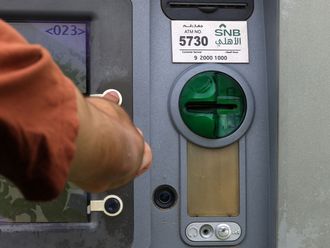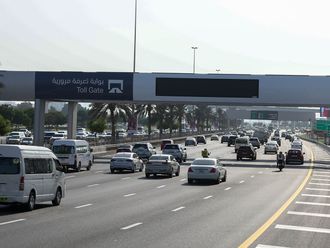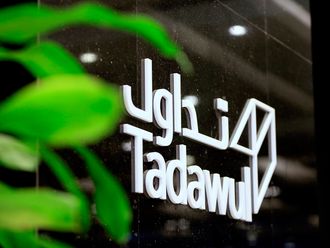
The default on billions of dollars of loans by Ahmad Hamad Algosaibi and Brothers in 2009 was just the beginning of the problems for the Saudi conglomerate, but its impact on investor confidence in the Gulf would be no less pronounced.
For years, the company - which held stakes in Saudi British Bank as well as rights to bottle Pepsi in Saudi Arabia - seemed like a stable, solid investment with a bottom line boosted by rising oil prices and a booming Saudi economy. As a result, the fall of Al Ghosaibi not only shook investors in Saudi Arabia, but across the Gulf.
"On paper it may be one of the best companies [out there], but you can never control it. These companies from the outside look like they are growing — and they are growing —but you never know internally what is going on behind the curtains," said Charbel Azzi, head of client coverage for the Middle East and Africa at S&P Indices and a former banker with Standard Chartered.
New trends
It is a state of affairs that has highlighted the efforts to step up corporate governance in the Gulf, a region still known far more for its massive family-owned empires than for publicly listed companies. Business practices, experts say, have long been done in their own special way in the Gulf, but things are now starting to change.
"People would do business for multi-million or billion dollar deals on a handshake and that was just the way it was done in the region," said David Cafferty, senior compliance advisory specialist at law firm Clyde and Co.
"But suddenly people are saying well, a handshake just isn't good enough. Even within the family, even people who have known each other for years are now taking each other to court," he said. And it is not just a question of making deals.
Lisa Kelaart-Courtney, head of compliance advisory services at Clyde and Co, points out that it is proving more difficult for firms to borrow in a tough economic environment unless they can show strong corporate governance initiatives. Banks are no longer willing to throw money at firms unless they are sure what is going on in the boardroom.
"Lenders are now getting more sophisticated and looking at governance and compliance practices of the companies they are lending to as part of their due diligence," Kelaart-Courtney said.
Sophisticated lenders
"When the money is freely available, nobody really looks hard," Cafferty said. "But when money is tight you start looking very long and hard at what you're doing with it. That's why right now it seems like there has been a greater focus, in reality it's just coming into sharper focus."
Equally, while the Algosaibi case may highlight the major issues, such as allegations of outright fraud, PWC's Fahd Toonsi said that recent examples from Kuwait have also illustrated the challenges of basic mismanagement. Global Investment House and Investment Dar, two major Kuwaiti companies, are recent examples, he said.
"The decision making process was so flawed that many wrong decisions were made. There was such a lack of transparency and accountability and, because of this, wrong business decisions were made," he said.
"These were shining examples of the Kuwaiti economy in 2008 and they are now not what they used to be. These companies used to be sumo wrestlers and now they are bulimic."
Social responsibility
It is perhaps partly due to this that the uptick in efforts to increase corporate governance in the region has been pronounced since the financial crisis. Ratings agency S&P is one such company that has waded into the governance fray, launching its ESG corporate social responsibility index with Hawkamah last year. S&P started with 400 local companies and eventually wheedled that down to 100, around 60 of whom now appear in the rankings.
"The average grades are still low — the highest you have is a 36 out of 100 — but then again we did the same in India and I think the highest when we launched it in 2005 was 34 and today the highest is around 70. That's a big jump," Azzi said.
He believes that while hedge funds that may look at Gulf markets are by their very nature profit driven, they also pay attention to corporate governance. This fact is demonstrated, he said, by the popularity of S&P's India ESG index to fund managers.
"At the end of the day a hedge fund is going to want to get into a company that is there for the long term, not one that will disappear overnight," he said.
Major impacts
And it is not just private companies that are pushing corporate governance in the Gulf, market regulators too have been boosting their requirements for firms to demonstrate corporate responsibility. Saudi Arabia's Capital Markets Authority has been first among them, and has been buffeted recently by moves by the CMA to open the Gulf's biggest market to foreign investment.
"A move by the CMA to open the market will have two major impacts, the first is that companies will definitely try to improve corporate governance practices because they will be targeted by international companies who would like to either invest or perhaps even participate in boards of directors," said Abdul Aziz Al Yaqout, regional managing partner at DLA Piper Middle East.
He cites as evidence the example of Egypt, a market that has been open to foreign direct investment for some years and, Al Yaqout said, one that has seen a corresponding increase both in government regulation and practices across the EGX. Recent events notwithstanding, Cairo is a strong market, and its companies have responded positively to an increase in FDI, Al Yaqout said.
At the same time, Peter Gotke, vice-president of Depositary Receipts at BNY Mellon, believes that struggling markets such as the UAE — which saw plummeting trading volumes in Dubai and Abu Dhabi in 2011 — have more inclination to pursue stronger governance as they need to attract more FDI. Saudi, in many ways, can afford to be complacent.
"Saudi is a very internalised market. It has it's own momentum, a big population and a lot of government money sloshing around — so just from a philosophical point of view there is probably less pressure on the companies to abide by good corporate governance because there's less access to foreign investors and therefore it's less important," Gotke said.
"But for companies in the UAE and Qatar and arguably across the rest of the GCC and the Mena region where liquidity is very low and foreign investors are reluctant to venture, there is obviously a lot more reward for doing that."
S&P's Azzi, however, feels that while investors and a handful of companies — as well as regulators — are pushing the envelope in terms of better governance, many Gulf firms are yet to recognise the importance.
Poor response
"We had a few queries from companies that weren't on the index and we sent them the questionnaire and ask them to fill it out — it's 500 questions, by the way — and you know how many came back to me? Zero," he said.
As for private companies, Aziz added, the challenges are even steeper. He said that S&P toyed with the idea of doing a private companies ESG ranking, but quickly disregarded the idea when they realised just how difficult it was persuading most private firms to reveal details about how the company is run.
"It's very difficult to go to a company and say open your books, I want to see if you guys are ESG compliant or not. There are a lot of Algosaibis in Saudi that are scared of that, because a lot of under the table things go on."
It is a point that PWC's Toonsi, with much experience of dealing with regional companies on corporate governance issues, is happy to concede.
"Many of the companies that we work with in the GCC are primarily prompted to react on their corporate governance by the regulators, even though they are listed. We see very few unlisted companies coming to us and seeking advice," he said.












